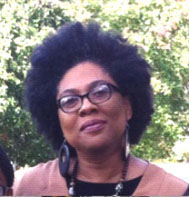Governments all around the world, with a few rare exceptions, have been notoriously bad at preparing and inspiring innovative technology business leaders and innovators.
In developing countries like Guyana, civil society groups, the private sector and motivated individuals or teams tend to do the best job of inspiring and preparing innovators because they often have access to new technology and expertise, and are able to react quickly to competitive or industrial environments that require them to adapt to survive. Private entities will also have no problem trying various programs and disposing of those that do not work, often without having to answer to opposition elements or constituencies. For example,

Co-Founder STEMGuyana
private organizations like First Robotics Inc. and K12youthcode, LLC have introduced self-sustaining, innovative programs that encourage principles of project based learning while strengthening STEM skills in students. These are the programs that encourage unbridled student curiosity and foster the development of innovative minds that developing economies desperately need to compete globally within the next ten to twenty years.
According to Code.org, 90 per cent of parents in the US want their children to learn Computer Science in school. Parents believe that coding will be a critical skill for many jobs in the near future, but only 40 per cent of US schools teach it. In Guyana, I am not sure that parents yet understand how critical it is to prepare their children for the next wave of innovative industries but it is clear that education remains an important path to success for many families. Parents and schools in Guyana will also have to revisit cultural norms like corporal punishment to determine whether such punitive measures foster the level of freedom and innovative thinking in the classroom needed for our young innovators to compete globally.

Students who learn to code must also be exposed to quality Math and Science instruction, but learning to code should not be the end goal. Coding really becomes a weapon of mass economic empowerment when put in the hands of creative students, who excel in Math and Science and who are attuned to problems in their communities, region and the world. The next generation of innovative leaders in Guyana will have to be creative, problem solvers and thinkers, who are also sharp in the STEM subjects. Some say the ability to ‘just code’ will become commoditized and it will be the coders who are creatives, innovators, artists, hustlers, problem-solvers, and marketers, who will be able to rapidly propel Guyana’s development forward.
Governments will be expected to prepare quality teachers who can deliver the STEM curriculum in an effective manner to students of all socio-economic levels. Parents will have to reach out for online or technology tools like khanacademy.com or mathlynx.com, to ensure that their children access the quality of education that will allow them to compete globally. Civil society and the private sector will have to continue to provide innovative programs that serve to teach and inspire students and provide them opportunities to engage in project-based learning, to be exposed to advanced technology and to engage in opportunities not available in schools. Guyanese venture capitalist also have an important role to play as they will have to step up to play a larger role in investing in innovative technology solutions that promise a significant return on investment for the new generation of Guyanese business founders and their financial backers.

The next generation of Guyanese innovators will be tasked with the rapid development of Guyana or else Guyana be forced to continue to pay a premium to import innovators and problem solvers from countries that are investing in their students today. Facebook CEO Mark Zuckerberg believes that in 15 years, we will teach coding the way we teach Math and English in school. Students will need to develop the skill of coding not because they will go into it as a career, but because coding will impact every career in the 21st-century world. Leaders of any country recognizing that will benefit tremendously in the long term.





